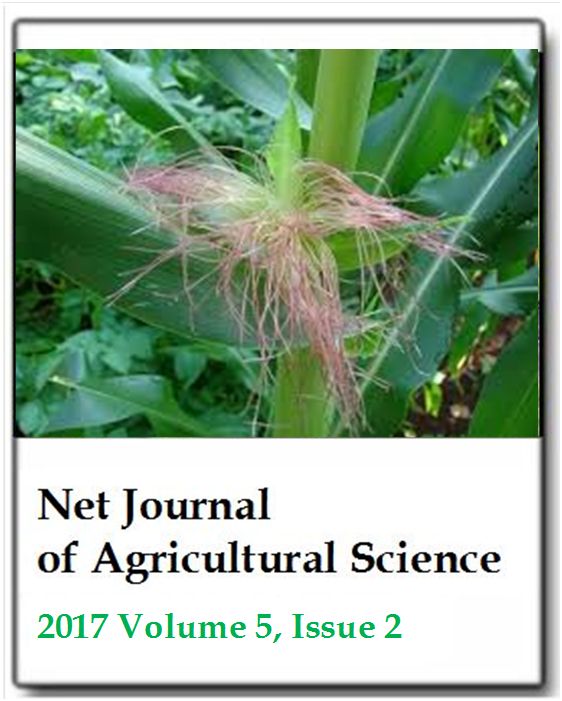The effect of water stress, salicylic acid and bio-fertilizer on quality of leaf and seed essential oil, and oil components of coriander
Yeganehpoor F.*, Zehtab-Salmasi S., Ghassemi-Golezani K., Shafagh-Kolvanagh J. and Dastborhan S.Net Journal of Agricultural Science
Published: May 9 2017
Volume 5, Issue 2
Pages 38-47
Abstract
A field experiment was conducted to evaluate the effect of salicylic acid (SA) and bio-fertilizer on quality of leaves and seeds essential oils and seeds oil constituents of coriander under different irrigation treatments. The treatments were irrigation intervals (irrigation after 60, 90 and 120 mm evaporation from class A pan) and combination of fertilization (control, 100 kg ha-1 Urea, Nitrokara (as biofertilizer), and 50% Urea + Nitrokara) and salicylic acid (0 and 1 mM) that were allocated to main and sub-plots, respectively. Leaves and seeds essential oils were analyzed by gas chromatography mass spectroscopy (GC/MS). Results revealed that (E)-2-decenal was major component in essential oil of coriander leaves, while the main constituent of essential oil in seeds under all treatments was linalool. Water stress increased all major components of leaves essential oil, especially in untreated plants with SA. Application of nitrogen fertilizers, particularly 50% Urea + Nitrokara, had an additive effect on leaves essential oil constituents. Effect of salicylic acid on essential oil constituents of leaves was minimal. Increasing irrigation intervals led to a slight increment in concentration of all major components of essential oil, except y-terpinene. Application of SA and nitrogen fertilizers (especially 50% Urea + Nitrokara) improved seed essential oil quality by increasing the linalool and y-terpinene contents. Based on the results of the GC analysis, the major fatty acid in coriander seeds oil was petroselinic acid, followed by oleic, linoleic, palmitic, stearic, myristic and linolenic acids in all treatments. Water deficit increased percentage of petroselinic, oleic and palmitic acids, and reduced linoleic and linolenic acids. The application of nitrogen fertilizers, especially 50% Urea and Nitrokara, decreased stearic acid content, but increased other fatty acids. Exogenous application of salicylic acid led to increment in unsaturated fatty acids of seed oil, except linolenic acid. Therefore, application of bio-fertilizers and salicylic acid could be recommended for improving quality of essential oil and oil components of coriander seeds under different water availabilities.
Keywords: Coriander, essential oil, fatty acid, fertilizer, irrigation, salicylic acid.
Full Text PDF
ISSN: 2315-9766
